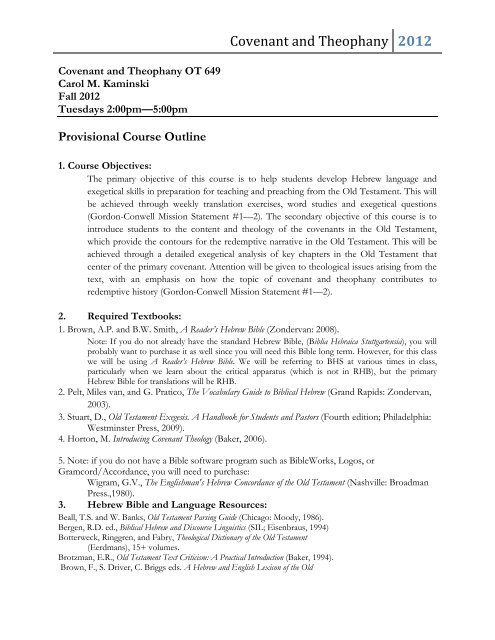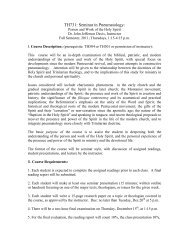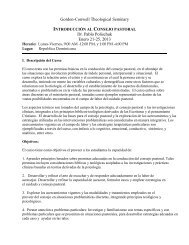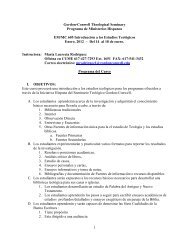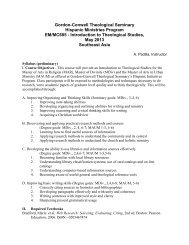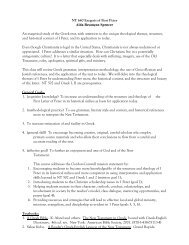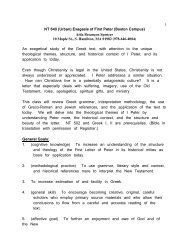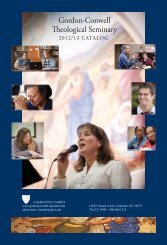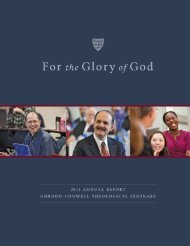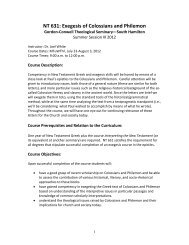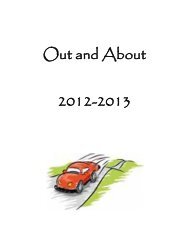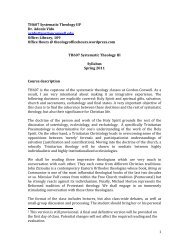Covenant and Theophany 2012 - Gordon-Conwell Theological ...
Covenant and Theophany 2012 - Gordon-Conwell Theological ...
Covenant and Theophany 2012 - Gordon-Conwell Theological ...
Create successful ePaper yourself
Turn your PDF publications into a flip-book with our unique Google optimized e-Paper software.
<strong>Covenant</strong> <strong>and</strong> <strong>Theophany</strong> OT 649<br />
Carol M. Kaminski<br />
Fall <strong>2012</strong><br />
Tuesdays 2:00pm—5:00pm<br />
Provisional Course Outline<br />
<strong>Covenant</strong> <strong>and</strong> <strong>Theophany</strong> <strong>2012</strong><br />
1. Course Objectives:<br />
The primary objective of this course is to help students develop Hebrew language <strong>and</strong><br />
exegetical skills in preparation for teaching <strong>and</strong> preaching from the Old Testament. This will<br />
be achieved through weekly translation exercises, word studies <strong>and</strong> exegetical questions<br />
(<strong>Gordon</strong>-<strong>Conwell</strong> Mission Statement #1—2). The secondary objective of this course is to<br />
introduce students to the content <strong>and</strong> theology of the covenants in the Old Testament,<br />
which provide the contours for the redemptive narrative in the Old Testament. This will be<br />
achieved through a detailed exegetical analysis of key chapters in the Old Testament that<br />
center of the primary covenant. Attention will be given to theological issues arising from the<br />
text, with an emphasis on how the topic of covenant <strong>and</strong> theophany contributes to<br />
redemptive history (<strong>Gordon</strong>-<strong>Conwell</strong> Mission Statement #1—2).<br />
2. Required Textbooks:<br />
1. Brown, A.P. <strong>and</strong> B.W. Smith, A Reader’s Hebrew Bible (Zondervan: 2008).<br />
Note: If you do not already have the st<strong>and</strong>ard Hebrew Bible, (Biblia Hebraica Stuttgartensia), you will<br />
probably want to purchase it as well since you will need this Bible long term. However, for this class<br />
we will be using A Reader’s Hebrew Bible. We will be referring to BHS at various times in class,<br />
particularly when we learn about the critical apparatus (which is not in RHB), but the primary<br />
Hebrew Bible for translations will be RHB.<br />
2. Pelt, Miles van, <strong>and</strong> G. Pratico, The Vocabulary Guide to Biblical Hebrew (Gr<strong>and</strong> Rapids: Zondervan,<br />
2003).<br />
3. Stuart, D., Old Testament Exegesis. A H<strong>and</strong>book for Students <strong>and</strong> Pastors (Fourth edition; Philadelphia:<br />
Westminster Press, 2009).<br />
4. Horton, M. Introducing <strong>Covenant</strong> Theology (Baker, 2006).<br />
5. Note: if you do not have a Bible software program such as BibleWorks, Logos, or<br />
Gramcord/Accordance, you will need to purchase:<br />
Wigram, G.V., The Englishman's Hebrew Concordance of the Old Testament (Nashville: Broadman<br />
Press.,1980).<br />
3. Hebrew Bible <strong>and</strong> Language Resources:<br />
Beall, T.S. <strong>and</strong> W. Banks, Old Testament Parsing Guide (Chicago: Moody, 1986).<br />
Bergen, R.D. ed., Biblical Hebrew <strong>and</strong> Discourse Linguistics (SIL; Eisenbraus, 1994)<br />
Botterweck, Ringgren, <strong>and</strong> Fabry, <strong>Theological</strong> Dictionary of the Old Testament<br />
(Eerdmans), 15+ volumes.<br />
Brotzman, E.R., Old Testament Text Criticism: A Practical Introduction (Baker, 1994).<br />
Brown, F., S. Driver, C. Briggs eds. A Hebrew <strong>and</strong> English Lexicon of the Old
<strong>Covenant</strong> <strong>and</strong> <strong>Theophany</strong> <strong>2012</strong><br />
Testament (Oxford: Clarendon Press., 1951).<br />
Holladay, W. L., A Concise Hebrew <strong>and</strong> Aramaic Lexicon of the Old Testament (Gr<strong>and</strong><br />
Rapids: Eerdmans, 1971).<br />
Joüon, P. A Grammar of Biblical Hebrew (revised ed.; trans. <strong>and</strong> rev. by T. Muraoka<br />
(Rome: Editrice Pontificio Istituto Biblico, 1993). 2 Volumes.<br />
Kautzsch, E. <strong>and</strong> A. E. Cowley, eds. Gesenius' Hebrew Grammar (2nd. ed.; Oxford:<br />
Clarendon Press, 1999 [1910]).<br />
Longacre, R.E., Joseph: A story of divine providence: A text theoretical <strong>and</strong><br />
textlinguistic Analysis of Genesis 37 <strong>and</strong> 39—48 (Eisenbrauns, 1989).<br />
Waltke B. K. <strong>and</strong> M. O'Connor, An Introduction to Biblical Hebrew Syntax (Winona<br />
Lake: Eisenbrauns, 1990).<br />
Williams, R. J. Hebrew Syntax: An Outline (Toronto: Univ. of Toronto Press, 1976).<br />
Wolde, Ellen van, ed., Narrative Syntax <strong>and</strong> the Hebrew Bible (Brill, 2002).<br />
4. Selective Bibliography on <strong>Covenant</strong>s:<br />
Andersen, F., ‘The Scope of the Abrahamic <strong>Covenant</strong>’, Churchman 74 (1960), pp. 239-44.<br />
Anderson, B.W., ‘Creation <strong>and</strong> the Noachic <strong>Covenant</strong>’, in P.N. Joranson <strong>and</strong> K. Butigan (eds.), Cry of the<br />
Environment (Santa Fe: Bear <strong>and</strong> Co., 1984), pp. 45-61.<br />
Beckwith, R.T., ‘The Unity <strong>and</strong> Diversity of God’s <strong>Covenant</strong>s’, TynBul 38 (1987), pp. 93-118.<br />
Busenitz, I.A., ‘Introduction to the Biblical <strong>Covenant</strong>s; the Noahic <strong>Covenant</strong> <strong>and</strong> the Priestly <strong>Covenant</strong>’,<br />
Master's Seminary Journal 10 (1999), pp. 173-89.<br />
Dumbrell, W.J., ‘Kingship <strong>and</strong> Temple in the Post-Exilic Period’, RTR 37 (1978), pp. 33-42.<br />
—‘The Prospect of Unconditionality in the Sinaitic <strong>Covenant</strong>’, in A. Gileadi (ed.), Israel’s Apostasy <strong>and</strong><br />
Restoration (Festschrift R.K. Harrison; Gr<strong>and</strong> Rapids: Baker, 1988), pp. 141-55.<br />
Eichrodt, W., ‘<strong>Covenant</strong> <strong>and</strong> Law: Thoughts on Recent Discussion’, Int 20 (1966), pp. 302-21.<br />
Fensham, F.C., ‘The <strong>Covenant</strong> as Giving Expression to the Relationship Between Old <strong>and</strong> New Testament’,<br />
TynBul 22 (1971), pp. 82-94.<br />
Fox, M.V., ‘The Sign of the <strong>Covenant</strong>: Circumcision in the Light of the Priestly ’ôt Etiologies’, RB 81 (1974),<br />
pp. 557-96.<br />
Freedman, D.N., ‘Divine Commitment <strong>and</strong> Human Obligation: The <strong>Covenant</strong> Theme’ Int 18 (1964), pp. 419-<br />
31.<br />
Gerstenberger, E., ‘<strong>Covenant</strong> <strong>and</strong> Comm<strong>and</strong>ment’, JBL 84 (1965), pp. 38-51.<br />
Hillers, D.R., ‘A Note on Some Treaty Terminology in the Old Testament’, BASOR 176 (1964), pp. 46-47.<br />
Hoenig, S.B., ‘Circumcision: The <strong>Covenant</strong> of Abraham’, JQR 53 (1962), pp. 222-34.<br />
Kaiser, W.C., Jr, ‘The Davidic Promise <strong>and</strong> the Inclusion of the Gentiles (Amos 9:9-15 <strong>and</strong> Acts 15:13-18): A<br />
Test Passage for <strong>Theological</strong> Systems’, JETS 20 (1977), pp. 97-111.<br />
Karlberg, M.W., ‘<strong>Covenant</strong> <strong>and</strong> Common Grace’, WTJ 50 (1988), pp. 323-37.<br />
—‘Legitimate Discontinuities Between the Testaments’, JETS 28 (1985), pp. 9-20.<br />
—‘Reformed Interpretation of the Mosaic <strong>Covenant</strong>’, WTJ 43 (1980), pp. 1-57.<br />
Kline, Meredith G., Treaty of the Great King (Gr<strong>and</strong> Rapids: Eerdmans, 1963).<br />
___, M.G., ‘Abram’s Amen’, WTJ 31 (1968), pp. 1-11.<br />
—‘Canon <strong>and</strong> <strong>Covenant</strong>’, WTJ 32 (1969), pp. 49-72.<br />
—‘Gospel Until the Law: Rom 5:13-14 <strong>and</strong> the Old <strong>Covenant</strong>’, JETS 34 (1991), pp. 433-46.<br />
—‘The Old Testament Origins of the Gospel Genre’, WTJ 38 (1975), pp. 1-27.<br />
__, By Oath Consigned (Gr<strong>and</strong> Rapids: Eerdmans, 1968).<br />
___, The Structure of Biblical Authority (Gr<strong>and</strong> Rapids: Eerdmans, 1972).<br />
Kruse, H., ‘David’s <strong>Covenant</strong>’, VT 35 (1985), pp. 139-64.
<strong>Covenant</strong> <strong>and</strong> <strong>Theophany</strong> <strong>2012</strong><br />
Levenson, J.D., ‘The Davidic <strong>Covenant</strong> <strong>and</strong> its Modern Interpreters’, CBQ 41 (1979), pp. 205-19.<br />
Loewenstamm, S.E., ‘The Divine Grants of L<strong>and</strong> to the Patriarchs’, JAOS 91 (1971), pp. 509-10.<br />
Mitchell, J.J., ‘Abram’s Underst<strong>and</strong>ing of the Lord’s <strong>Covenant</strong>’, WTJ 32 (1969), pp. 24-48.<br />
Moberly, R.W.L., ‘Abraham's Righteousness (Genesis 15:6)’, in J.A. Emerton (ed.), Studies in the Pentateuch<br />
(VTSup, 41; Leiden: E.J. Brill, 1990), pp. 103-30.<br />
Motyer, J.A., ‘<strong>Covenant</strong> <strong>and</strong> Promise’, Evangel 1:1 (1983), pp. 2-4.<br />
—‘<strong>Covenant</strong>, Law <strong>and</strong> Sacrifice’, Evangel 1:3 (1983), pp. 3-5.<br />
—‘The Normative <strong>Covenant</strong>’, Evangel 1:2 (1983), pp. 3-5.<br />
—‘The Perfection of the <strong>Covenant</strong>’ Evangel 1:4 (1983), pp. 3-5.<br />
Muilenburg, J., ‘Abraham <strong>and</strong> the Nations: Blessing <strong>and</strong> World History’, Int 19 (1965), pp. 387-98.<br />
—‘The Form <strong>and</strong> Structure of the <strong>Covenant</strong>al Formulations’ VT 9 (1959), pp. 347-65.<br />
McCarthy D.J., ‘B erît <strong>and</strong> <strong>Covenant</strong> in the Deuteronomistic History’, in G.W. Anderson, et al. (eds.), Studies in<br />
the Religion of Ancient Israel (VTSup, 23; Leiden: E.J. Brill, 1972), pp. 5-85.<br />
—‘B erît in Old Testament History <strong>and</strong> Theology’ Bib 53 (1972), pp. 110-21.<br />
—‘<strong>Covenant</strong> in the Old Testament: The Present State of Inquiry’, CBQ 27 (1965), pp. 217-40.<br />
—‘Three <strong>Covenant</strong>s in Genesis’, CBQ 26 (1964), pp. 179-89.<br />
McCarthy, D.J., ‘<strong>Covenant</strong> Relationships’, in C. Brekelmans (ed.), Questions disputées d’Ancien Testament (BETL,<br />
33; Leuven: Leuven University, 1974), pp. 91-103.<br />
Niehaus, J., “An Argument against <strong>Theological</strong>ly Constructed <strong>Covenant</strong>s,” JETS 50: 2 (2007), pp 259-273.<br />
____, “<strong>Covenant</strong>: an Idea in the Mind of God,” JETS 52: 2 (2009), pp 225-255.<br />
Pierce, R.W., ‘<strong>Covenant</strong> Conditionality <strong>and</strong> a Future for Israel’, JETS 37 (1994), pp. 27-38.<br />
Rendtorff, R., ‘“<strong>Covenant</strong>” as a Structuring Concept in Genesis <strong>and</strong> Exodus’, JBL 108 (1989), pp. 385-93.<br />
—‘Noah, Abraham <strong>and</strong> Moses: God's <strong>Covenant</strong> Partners’, in E. Ball (ed.), In Search of True Wisdom (Festschrift<br />
R.E. Clements; JSOTSup, 300; Sheffield: Sheffield Academic Press, 1999), pp. 127-36.<br />
Robertson, O.P., ‘Current Reformed Thinking on the Nature of the Divine <strong>Covenant</strong>s’, WTJ 40 (1978), pp.<br />
63-76.<br />
—‘Genesis 15:6: New <strong>Covenant</strong> Expositions of an Old <strong>Covenant</strong> Text’, WTJ 42 (1980), pp. 259-90.<br />
Ruiten, J. van, ‘The <strong>Covenant</strong> of Noah in Jubilees 6.1-38’, in S.E. Porter <strong>and</strong> J.C.R. de Roo (eds.), Concept of the<br />
<strong>Covenant</strong> in the Second Temple Period (JSJSup, 71; Boston: Brill, 2003), pp. 167-90.<br />
Schreiner, T.R., ‘The Abolition <strong>and</strong> Fulfilment of the Law in Paul’, JSNT 35 (1989), pp. 47-74.<br />
—‘Did Paul Believe in Justification by Works?: Another Look at Romans 2’, Bulletin for Biblical Research 3<br />
(1993), 131-58.<br />
—‘ Is Perfect Obedience to the Law Possible?: A Re-examination of Galatians 3:10’, JETS 27 (1984), pp.<br />
151-60.<br />
Snijders, L.A., ‘Genesis XV. The <strong>Covenant</strong> with Abram’, OTS 12 (1958), pp. 261-79.<br />
Stek, J.H., ‘“<strong>Covenant</strong>” Overload in Reformed Theology’, CTJ 29 (1994), pp. 12-41.<br />
Weinfeld, M., ‘B erît — <strong>Covenant</strong> vs. Obligation’, Bib 56 (1975), pp. 120-28.<br />
—‘The <strong>Covenant</strong> of Grant in the Old Testament <strong>and</strong> in the Ancient Near East’, JAOS 90 (1970), pp. 184-<br />
203.<br />
—‘The Loyalty Oath in the Ancient Near East’, UF 8 (1976), pp. 379-414.<br />
�Class Attendance: Please note that class attendance is required. If you miss more than two classes,<br />
you will not be able to take the class for credit.<br />
�Cell Phones: Please turn cell phones to silent before class.<br />
���� Use of the internet is strictly prohibited during class (including use of the internet on phones,<br />
computers or ipads), but is permissible during breaks.
6. Course Requirements:<br />
<strong>Covenant</strong> <strong>and</strong> <strong>Theophany</strong> <strong>2012</strong><br />
1. Passing of Hebrew Competency Exam:<br />
A Hebrew competency exam is scheduled for the first day of class, Sept. 11 th . The exam will include<br />
vocabulary, parsing of verbs, <strong>and</strong> translation. Since you will not be given any passage to study prior<br />
to class on Sept. 11 th , the best way to prepare for this exam is to review your first year Hebrew<br />
grammar <strong>and</strong> review basic Hebrew vocabulary. You need to pass the exam in order to take the class<br />
for credit.<br />
2. In-class Hebrew Translation: points deducted for inadequate Hebrew translation<br />
As a 600-level Hebrew exegesis course, you will be required to translate approximately ten chapters<br />
of Hebrew from the Old Testament on selected texts related to the topic of covenant <strong>and</strong><br />
theophany. Each class will have time set aside for Hebrew translation. Several people will be called<br />
upon each week to translate one or two verses from the weekly translation. Please note that you are<br />
not allowed to use your computer for in-class Hebrew translation. This means that you will need to<br />
translate directly from A Reader’s Hebrew Bible or from a notebook or print-out of your translation,<br />
including any translation notes you may have. When you are called upon in class, you will be<br />
required to translate the verse(s), parse every verb, <strong>and</strong> answer basic Hebrew grammar questions. No<br />
grade will be assigned for this section; however, a two to five point deduction will be taken off your final grade<br />
for this course for one of the following reasons:<br />
a. failure to have completed the assigned translation prior to class.<br />
b. inadequate Hebrew translation in class.<br />
2. Hebrew Vocabulary: 10% of final grade<br />
Since you are allowed to make use of the vocabulary provided in RHB for the Hebrew translation<br />
exam, you are required to know all Hebrew words occurring at a frequency of 79 times or more (450<br />
words according to van Pelt <strong>and</strong> Pratico, p. 25). Remember that you have already learnt many of<br />
these words in first year Hebrew. You will be tested on this Hebrew vocabulary (450 words) on<br />
Tuesday, November 20 th (details below).<br />
3. Exegesis Paper: 30% of final grade<br />
You are required to submit an exegetical paper using the tools <strong>and</strong> methods taught in class. The<br />
exegetical paper is worth 30% of your final grade <strong>and</strong> is due on Tuesday November 13 th (this is<br />
during reading week). Your paper is to be submitted to the mailroom by 4:00pm (Kaminski Box<br />
#255), or it can be placed outside my office in the box provided. If you plan to be away during<br />
reading week, you can send your paper in the mail to the seminary marked Dr Kaminski, but it<br />
needs to be postmarked by the post office on Nov. 12. Please note that no electronic versions will be<br />
accepted; only hard copies of your paper. Late penalties will apply, except in the case of special<br />
circumstances (eg. personal illness, bereavement etc.). The format for the exegesis paper is outlined<br />
below.
<strong>Covenant</strong> <strong>and</strong> <strong>Theophany</strong> <strong>2012</strong><br />
4. Hebrew Vocabulary <strong>and</strong> Essay Question Exam: 30% of final grade (includes Hebrew vocabulary)<br />
All students are required to take a final exam which will entail a) Hebrew vocabulary: testing of<br />
Hebrew words occurring 79 times or more (450 words); <strong>and</strong> b) one essay question on the covenants.<br />
Please note that two essays will be given in the exam, taken from a range of topics based on the<br />
weekly topics covered in class. You are permitted to select one of two possible essays which are<br />
provided. The final exam is worth 30% of your final grade (the vocabulary portion is worth 10%; the<br />
essay question is worth 20%). It is scheduled for Tuesday, November 20 th .<br />
5. Final Exam: Hebrew Translation 40% of final grade<br />
All students are required to take a Hebrew translation exam which will comprise of the Hebrew<br />
translations that you have been doing each week (you are required to translate the texts <strong>and</strong> parse all<br />
verbs). No lexicons are allowed but vocabulary is provided which occurs in the footnotes of RHB.<br />
The translation exam is worth 40% of your final grade. It is scheduled for Tuesday, December 11 th .<br />
6. Required Readings: points deducted off final grade if incomplete<br />
Since emphasis has been placed on Hebrew acquisition in this course, only minimal reading<br />
requirements have been assigned. The following readings are required for the course:<br />
1. Horton, Introducing <strong>Covenant</strong> Theology (to be read in its entirety).<br />
2. Kaminski, C.M. CASKET EMPTY: God’s Plan of Redemption through History. You are<br />
required to read chapter 2, “Abraham,” <strong>and</strong> the sections on the Mosaic <strong>Covenant</strong> (pp. 63-92)<br />
<strong>and</strong> the Davidic <strong>Covenant</strong> (pp. 108-114).<br />
3. Stuart, D., Old Testament Exegesis. You are not required to read this in its entirety, but you<br />
will need to read portions of this book when you write your final exegesis paper.<br />
You will be asked on your final exam to state what percentage of the required readings you have<br />
read. Failure to have completed the readings may result in a 3-5 point grade deduction.<br />
7. Hebrew Competency:<br />
In 600 <strong>and</strong> 700 level Hebrew exegesis courses, you are required to show competency in the Hebrew<br />
language. If you do not demonstrate Hebrew competency (evaluated through in-class translation,<br />
Hebrew translation exam, Hebrew vocabulary knowledge, <strong>and</strong> Hebrew grammar in your paper), you<br />
will not be given a passing grade (even if you pass the course according to your grade point average).<br />
See the GCTS Catalog: “At both the OT 600 <strong>and</strong> OT 700 levels, competency in Hebrew<br />
must be demonstrated by the student in all aspects of the course in order for a passing grade<br />
to be assigned, regardless of how the course grade is otherwise computed” (p. 88).
<strong>Covenant</strong> <strong>and</strong> <strong>Theophany</strong> <strong>2012</strong><br />
���� Format for the Exegetical Paper:<br />
Each student is required to write a 15 page (no more than 15 pages is permitted) exegesis paper,<br />
double spaced, with footnotes. Sample papers will be on the reserve shelf in the library. You can<br />
select any passage in the Old Testament, provided that we have not studied the passage in class <strong>and</strong><br />
provided that it relates to the theme of covenant <strong>and</strong> theophany. You should choose no more than<br />
5-6 verses. You are required to do a minimum of five Hebrew word studies in your paper, but they<br />
are not to be words already done in class.<br />
• Do not make your outline a formal outline with subordinated letters <strong>and</strong> numbers. Rather, simply<br />
label each step with the following headings (consult Stuart, Old Testament Exegesis, pp. 65-76, <strong>and</strong> the<br />
book as a whole):<br />
1) Text <strong>and</strong> Translation: a) Begin with the Hebrew Text at the top of the page using RHB, but<br />
include footnotes commenting on the textual variants (you will need to use the critical apparatus in<br />
BHS); b) the Hebrew text is to be immediately followed by your own translation, which should<br />
include footnotes noting how English Bibles translate the passage (e.g. NIV, NRSV, NASB) <strong>and</strong><br />
reasons for your translation.<br />
2) Grammatical <strong>and</strong> Lexical Data: Include in this section five Hebrew word studies <strong>and</strong> a verseby-verse<br />
analysis of the grammar (consult several Hebrew grammars, such as Jouon, Gesenius,<br />
Waltke).<br />
3) Form <strong>and</strong> Structure: Identify briefly the genre of your passage (e.g. whether it is narrative,<br />
poetic, a wisdom saying, prophetic, etc.), <strong>and</strong> note any structural elements that are evident in your<br />
passage.<br />
4) Literary-Historical Context: Locate your passage in the book as a whole, noting where the<br />
passage occurs according to its literary context <strong>and</strong> why this is significant for interpretation. In this<br />
section you will also provide information about the historical context of the passage, including<br />
providing a date for your text. One paragraph (or two if it is controversial) will also need to be<br />
devoted to the authorship of your passage, discussing scholarly views <strong>and</strong> how they impact issues<br />
such as authorship <strong>and</strong> historical context for your passage. You will want to interact with<br />
commentaries <strong>and</strong> articles, discussing any debated issues <strong>and</strong> important historical background<br />
information.<br />
5) Biblical-<strong>Theological</strong> Context: Make note of important theological issues arising from the text<br />
<strong>and</strong> how your passage contributes theologically to our underst<strong>and</strong>ing of key aspects of the faith.<br />
Note if the passage is cited elsewhere in the Bible <strong>and</strong> how this contributes to our underst<strong>and</strong>ing of<br />
the passage.<br />
6) Application: In this section you will provide a description of how the passage is to be applied in<br />
a local church context.<br />
7) Bibliography: It is expected that you will consult major commentaries <strong>and</strong> scholarly work on the<br />
passage, as well as key articles related to your passage.<br />
Plagiarism: Be aware that the seminary has a strict policy on plagiarism (see the Student<br />
H<strong>and</strong>book). Be certain to footnote all sources used, giving credit where credit is due. If I<br />
find that you have not adequately cited sources, you will automatically receive a Fail grade<br />
for the paper <strong>and</strong> it will be returned to you. For further information on what constitutes<br />
plagiarism, see the following website: www.indiana.edu/~wts/wts/plagiarism.html
<strong>Covenant</strong> <strong>and</strong> <strong>Theophany</strong> <strong>2012</strong><br />
Provisional Course Schedule<br />
Week 1: Tuesday September 11<br />
Introduction to the Course <strong>and</strong> Exegesis<br />
• Hebrew Competency Exam<br />
• Introduction to Hebrew Exegesis<br />
���� Homework to be completed before next Tuesday:<br />
� Translate Gen. 2.16-17; 3.1-16<br />
Week 2: Tuesday September 18<br />
The Adamic <strong>Covenant</strong> (Gen. 2—3, Rom. 5)<br />
• Be prepared to translate Gen. 2.16-17; 3.1-16.<br />
���� Homework to be completed before next Tuesday:<br />
� Translate Gen. 6:5-9; 8:20-22; 9:8-17<br />
Week 3: Tuesday September 25<br />
The Noachic <strong>Covenant</strong> <strong>Covenant</strong> (Gen. 6—9)<br />
• Be prepared to translate Gen. 6:5-9; 8:20-22; 9:8-17<br />
���� Homework to be completed before next Tuesday:<br />
� Translate Gen. 12:1-3; 15:1-18<br />
Week 4: Tuesday October 2<br />
The Abrahamic <strong>Covenant</strong> Part 1 (Gen. 12:1-3; 15; Rom. 4; Gal.3)<br />
• Be prepared to translate Gen. 12:1-3; 15:1-18<br />
���� Homework to be completed before next Tuesday:<br />
� Translate Gen. 17:1-22<br />
Week 5: Reading Week (October 8—12)<br />
Week 6: Tuesday Oct 16<br />
The Abrahamic <strong>Covenant</strong> Part 2 (Gen. 17; Rom. 4)<br />
• Be prepared to translate Gen. 17:1-22<br />
���� Homework to be completed before next Tuesday:<br />
� Translate Exod. 20:1-17; 24:1-8.<br />
Week 7: Tuesday October 23<br />
The Mosaic <strong>Covenant</strong> Part 1 (Exod. 20—24; Lev. 26)<br />
• Be prepared to translate Exod. 20:1-17; 24:1-8.<br />
���� Homework to be completed before next Tuesday:<br />
� Translate Deut. 30:1-3, 15-20; Jer. 11:1-8.
<strong>Covenant</strong> <strong>and</strong> <strong>Theophany</strong> <strong>2012</strong><br />
Week 8: Tuesday October 30<br />
The Mosaic <strong>Covenant</strong> Part 2 (Deut. 29—30; Jer. 11)<br />
• Be prepared to translate Deut. 30:1-3, 15-20; Jer. 11:1-8<br />
���� Homework to be completed before next Tuesday:<br />
� Translate 2 Samuel 7:1-17<br />
Week 9: Tuesday November 6<br />
The Davidic <strong>Covenant</strong> Part 1 (2 Sam. 7)<br />
• Be prepared to translate 2 Sam. 7:1-17.<br />
���� Homework to be completed before next Tuesday:<br />
� No translation; work on exegesis paper!<br />
Week 10: Reading Week (November 12—16)<br />
���� Exegesis Paper due Tuesday, November 13 th by 4:00pm.<br />
Week 11: Tuesday November 20<br />
���� Hebrew vocabulary <strong>and</strong> theology of covenants exam<br />
The Davidic <strong>Covenant</strong> Part 2 (2 Samuel 7; Ps. 89)<br />
• Translation of 2 Sam. 7:1-17 (continued from last week).<br />
���� Homework to be completed before next Tuesday:<br />
� Translate Jeremiah 31:31-37; 33:14-26<br />
Week 12: Tuesday November 27<br />
The New <strong>Covenant</strong> Part 1 (Jeremiah 31; Heb. 8—9)<br />
• Be prepared to translate Jeremiah 31:31-37; 33:14-26<br />
���� Homework to be completed before next Tuesday:<br />
� Translate Ezekiel 36:22-36<br />
Week 13: Tuesday December 4<br />
The New <strong>Covenant</strong> Part 2 (Ezekiel 36)<br />
• Be prepared to translate Ezek. 36 36:22-36<br />
���� Homework to be completed before next Tuesday:<br />
� Prepare for final exam<br />
Week 14: Tuesday December 11<br />
���� Final Exam


